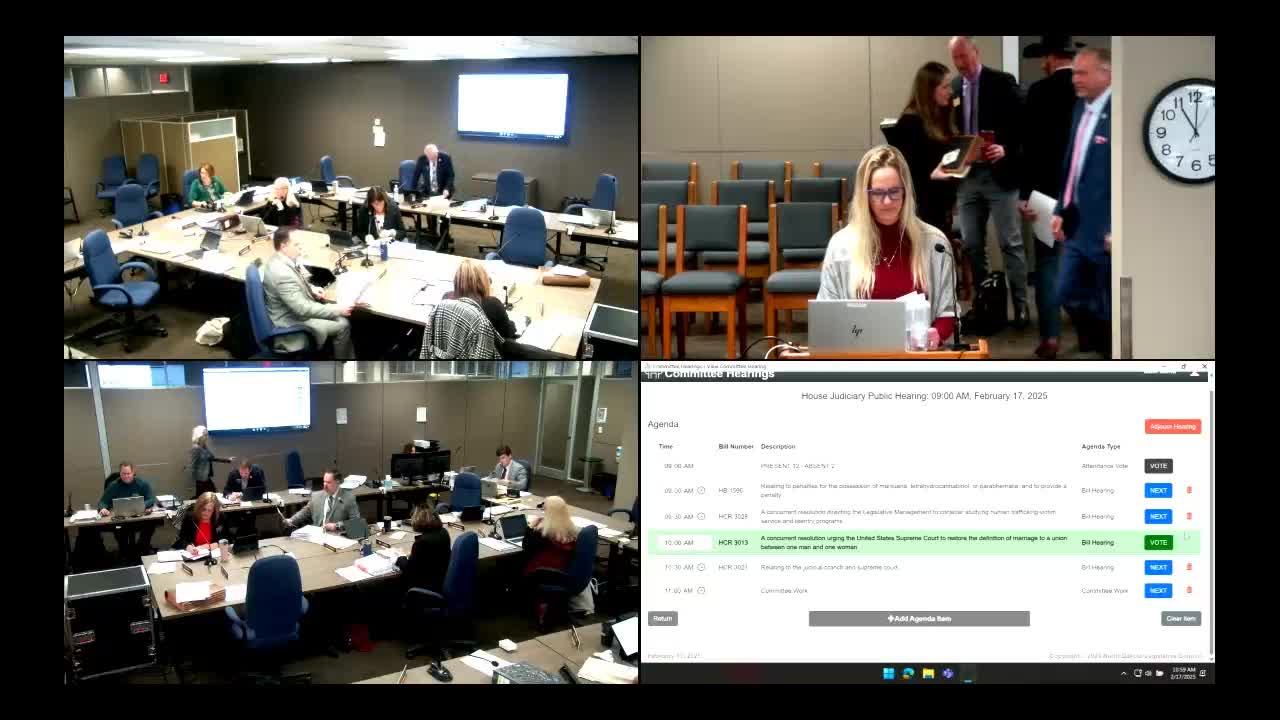Committee hears constitutional amendment resolution on judicial immunity and nominating appointments
February 17, 2025 | 2025 Legislature NC, North Carolina
This article was created by AI summarizing key points discussed. AI makes mistakes, so for full details and context, please refer to the video of the full meeting. Please report any errors so we can fix them. Report an error »

Representative Laurie Van Winkle told the committee House Concurrent Resolution 3021 would amend the state constitution to remove civil judicial immunity in certain circumstances, render judgments that violate due process or the state or federal constitution void, and require vacancies on the Supreme Court or district court to be filled through a bipartisan appointment committee.
Van Winkle cited several U.S. Supreme Court decisions and recent state decisions as evidence that judges have sometimes overreached and that the judiciary should face stronger scrutiny and accountability. "It is time we review the actions done by our judicial system," she said, arguing that judicial conduct and perceived politicization of rulings had eroded public confidence.
Opposition testimony came from Chris Joseph, legal counsel to the governor, who argued many of the concerns are already addressed by existing law and procedures. He noted appellate review can overturn judgments that violate constitutional or statutory requirements and pointed to NDCC provisions that permit suits against the state in certain circumstances. "We already have some of this covered in law," Joseph said.
Kara Erickson, disciplinary counsel, explained the Judicial Conduct Commission: a seven-member body (four lay members appointed by the governor, two judges elected by the Judicial Conference and one lawyer elected by the Bar Association) that investigates complaints, issues reprimands, suspensions or, in severe cases, removal.
Tony Wyler, executive director of the State Bar Association, opposed the resolution's changes to the judicial nominating committee and said the existing judicial nominating committee (JNC) process provides a bipartisan, statutorily prescribed system of permanent and temporary members who vet candidates and forward two to seven names to the governor for appointment; Wyler said the existing process has functioned and is already bipartisan.
Committee members asked about impeachment and the existing judicial-discipline processes; Van Winkle and testifiers acknowledged impeachment remains a constitutional option but said enforcement and remedies have been inadequate in some contested cases. The committee closed the hearing without recording a vote.
Van Winkle cited several U.S. Supreme Court decisions and recent state decisions as evidence that judges have sometimes overreached and that the judiciary should face stronger scrutiny and accountability. "It is time we review the actions done by our judicial system," she said, arguing that judicial conduct and perceived politicization of rulings had eroded public confidence.
Opposition testimony came from Chris Joseph, legal counsel to the governor, who argued many of the concerns are already addressed by existing law and procedures. He noted appellate review can overturn judgments that violate constitutional or statutory requirements and pointed to NDCC provisions that permit suits against the state in certain circumstances. "We already have some of this covered in law," Joseph said.
Kara Erickson, disciplinary counsel, explained the Judicial Conduct Commission: a seven-member body (four lay members appointed by the governor, two judges elected by the Judicial Conference and one lawyer elected by the Bar Association) that investigates complaints, issues reprimands, suspensions or, in severe cases, removal.
Tony Wyler, executive director of the State Bar Association, opposed the resolution's changes to the judicial nominating committee and said the existing judicial nominating committee (JNC) process provides a bipartisan, statutorily prescribed system of permanent and temporary members who vet candidates and forward two to seven names to the governor for appointment; Wyler said the existing process has functioned and is already bipartisan.
Committee members asked about impeachment and the existing judicial-discipline processes; Van Winkle and testifiers acknowledged impeachment remains a constitutional option but said enforcement and remedies have been inadequate in some contested cases. The committee closed the hearing without recording a vote.
View full meeting
This article is based on a recent meeting—watch the full video and explore the complete transcript for deeper insights into the discussion.
View full meeting
